Text
New Domain, Same App
Due to unforeseen circumstances, Lexiconga's domain name has been changed to https://lexiconga.com. While I prefer the old lexicon.ga address, I don't believe I'm going to be able to reclaim the domain for a while as control of the .ga registrar is being settled (though I'll definitely be on the lookout for it!).
The Lexiconga app remains exactly the same, and you can use your same login credentials to access your same dictionaries if you created an account.
Recovering Local-Only Dictionaries
If you did not create an account and your dictionary is only saved locally, there may still be a way to get your dictionary and import it back into lexiconga.com! Unfortunately, this will only work if you have been using Lexiconga on a browser that can access its Developer Tools.
1. Visit https://lexicon.ga
The page will either look weird and say "You are OFFLINE" OR your browser will say something like "This site can’t be reached. lexicon.ga’s server IP address could not be found." This is fine.
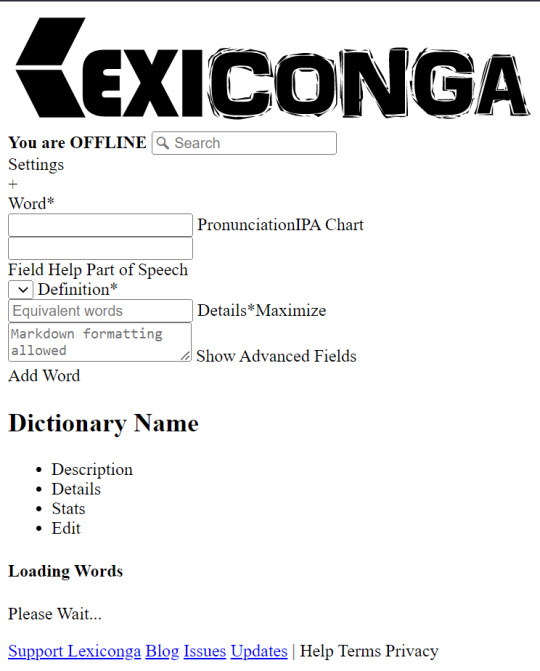
2. Right click the page and click "Inspect" from the menu
This will bring up the Developer Tools in most browsers that use Chromium or Firefox.
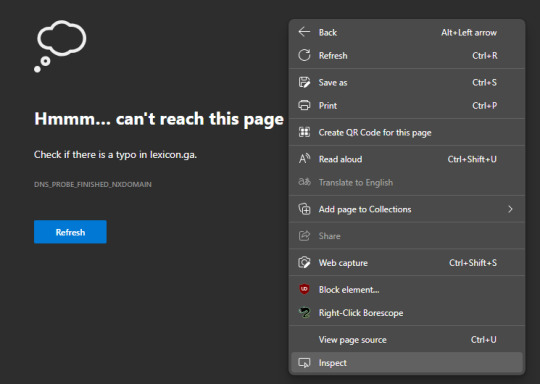
3. Click the "Application" tab and find "Local Storage" in the sidebar
At the top of the developer tools are tabs. Sometimes "Application" can be hidden within a button double arrows.
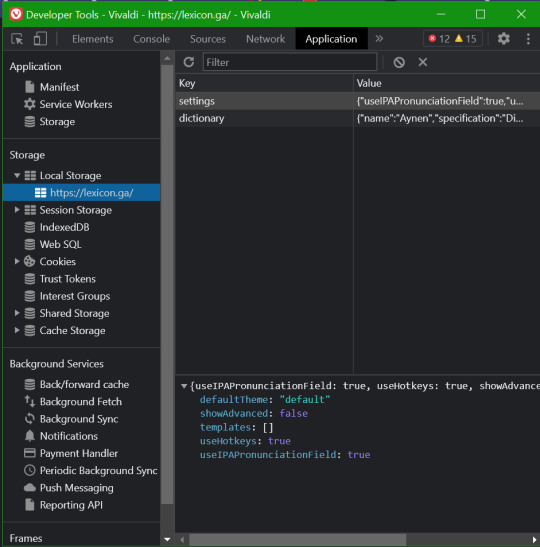
4. Copy & save the data
All your dictionary data and settings are stored in local storage. Make note of the key names and copy the JSON data into a text file.
5. Paste the data into lexiconga.com
Repeat steps 2 and 3 on the new domain, and when you see the empty local storage data, double-click in the key area and type the key of the data (either "settings" or "dictionary"), then in the value area, paste the data you copied eariler.
6. Refresh the page and continue as normal
If you did it correctly, your old dictionary should appear immediately as if nothing ever happened!
Please let me know if you run into any issues with this process, but if you copy and paste precisely, it shouldn't be any trouble.
#update#Lexiconga#conlanging#constructed languages#conlangs#tool#web development#webdev#internet#helpful#guide
7 notes
·
View notes
Text
Lexiconga's domain name (lexicon.ga) is currently broken because of some problem with the domain name registrar (Freenom.com). I don't know when the registrar will resolve the issue, but if it is not resolved within a couple more days, I'll be looking for other solutions. Sorry for any inconvenience this may cause!
You can rest assured that your dictionary data is still safe if you have a Lexiconga account! Please contact me if you want me to send you your data, but I'm hoping that the problem will be resolved before too long and it will be usable as normal.
If you do not have an account, it may still be possible for you to retrieve your dictionary from your browser. Please let me know if you need instructions, and I'll write a post on how to get your data!
3 notes
·
View notes
Photo


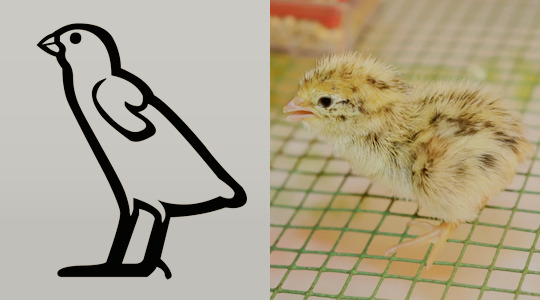



Hieroglyphs vs real life examples:
Egyptian vulture (ꜣ = “ah”)
flowering reed (i = “ee”)
quail chick (w = “oo”)
reed mat (p)
reed basket (k)
horned viper (f)
#heiroglyphics#writing systems#egypt#ancient egypt#egyptology#hieroglyphs#interesting#natural language#not conlanging
16K notes
·
View notes
Text
Since this is a problem for everyone who uses Lexiconga without an account on an Apple mobile device (iPhone or iPad) or who only uses Safari on MacOS, would it be helpful to include a special floating interface that makes it quicker and easier to save/load a dictionary from your device's file system?
I would probably only have it display on Safari browsers, but it would essentially be exactly the same as the Import/Export functionality already usable from the dictionary settings menu except in a more easily-accessible location.
Another option that might work is to save Lexiconga to your home page and just use it from there instead. I haven't extensively tested this, but it might be a good option because this apparently keeps its own 7-day timer that's based only on when it's opened, which should make your offline dictionary permanent...but I haven't tested it so I can't be 100% sure.
Anyway, if you have any thoughts on this or experience with using Lexiconga's offline mode in the Safari browser, please let me know!
-Robbie
Important Warning for Safari Users
Hey there Lexiconga users! If you use the Safari browser on any Apple devices (the default engine for iOS, iPad, and MacBook) and you've been relying on Lexiconga's offline mode (i.e. you don't have an account), then you should make an export of your dictionary AS SOON AS POSSIBLE and start using a different browser for Lexiconga. Or you can create an account to make sure your data is saved on our server.
If I'm scaring you, then that's Apple's fault. According to this post back in March that I completely missed until today, Apple has been working toward updating their Safari browser in a few good ways and one very questionable way: Safari will automatically remove local data from your browser if you haven't used the site in 7 days. Included in this list is the common browser storage called "localStorage," which Lexiconga exclusively uses to store offline data.
Which means that if 1) you don't have an account, 2) you're using Safari, and 3) you don't use Lexiconga at least once per week, your dictionary will disappear unless you're regularly exporting it to make backups.
(Making an account will make sure that your dictionary(/ies) are safely stored in our database so that even if Safari clears your data, you can just log in to get it back again.)
This is extremely frustrating because I really like Safari otherwise! I made Lexiconga offline-first because I didn't want to force people to create accounts just to use the tool. But if you're not already using a different browser that will keep your localStorage where you put it (like Firefox), then your Lexiconga dictionary is not safe unless you're making backups or/and have an account.
One irritating and dangerous caveat is that on iOS, all browsers use the Safari engine and are just styled differently! Just because your iPhone or iPad's browser is called Firefox or Chrome (confusingly) doesn't mean that you're exempt—it's Safari under the hood. On a MacBook, you're fine—Firefox and Other browsers actually are different than Safari—but iOS forces developers to use Safari as their browser engine. This may change someday, but as far as I know, Safari is still the only browser engine for iOS.
Anyway, everyone else who's not using Safari should be fine. Just keep an eye out for updates to your browser that restrict, reduce, or remove localStorage specifically if you want to keep using Lexiconga. I'll be trying to research better solutions for those of you who want to avoid creating an account, but for now, please just be sure to make regular backups if you don't have an account!
Happy conlanging,
- Robbie
5 notes
·
View notes
Text
Complete each step before you read the next one for a real challenge.
1. babble in gibberish for 3 - 5 seconds ( give yourself more time or do it in your head if you have speech delay or stutter) and then write all the sounds down.
2. Congratulations, this is your entire phonetic inventory. Assuming you have some to choose from, pick one consonant at random. If not, write down the first consonant that comes into your head.
3. Words can only end in either a vowel or this consonant. If you didn't make any vowel sounds before, speak in gibberish again making only vowel sounds for 3 - 5 seconds and add them to your inventory.
4. Now, see what you can do with this blueprint!
102 notes
·
View notes
Text
I can never remember any specific conlanging resources, but if you look back through some of the stuff I've reblogged, you'll find lots of interesting resources and blogs to help you get started!
Once you start coming up with words however, do yourself a favor and avoid using Excel or Word or something and use something like ConWorkShop.com or Lexiconga instead! ConWorkShop is a powerful tool with lots of linguistic flourish to help you round out your conlang plus a community and automatic linking between your words and the same words in other conlangs! Lexiconga is super fast, simple, and works entirely offline, though creating an account lets you access dictionaries from any computer and also store more than one dictionary much more easily. You can also (completely optionally) make your dictionary public so you can easily share it with others! Here are some of my (unfinished) conlangs in Lexiconga to give you an idea of what you can do with it: Gobahai, Ehw
Also hopefully me reblogging this can get some more eyes on your question! Best of luck as you start your conlanging journey!
hey y’all, do you have any good conlang resources? i just started making one and i have no idea what i’m doing lmaooo. would love some resources, help, or feedback :)
36 notes
·
View notes
Text
Lexiconga is now fully ad-free
I've been wanting to remove Lexiconga's advertisements for a while now, and I finally got a chance to do it today! The ads were essentially only there in the first place to 1) advertise my other personal projects, 2) give friends free exposure for cool things they did, and 3) to see if anyone else would be willing to help me pay for Lexiconga's hosting in exchange for exposure. Ultimately, they just ended up being an annoyance that didn't help anybody at all, which is the opposite of Lexiconga's purpose.
So I've finally just removed them wholesale.
That being said, I'm still hosting Lexiconga entirely on my own dollar, and while it's not that much of a burden for me, I would love to know that other people also like Lexiconga and want it to stay online! I know people use it and enjoy it (including myself), but I'd love to get some kind of monetary thank-you every now and again.
That sounded a little ominous... Let me say here and now in case I haven't before:
I intend to keep Lexiconga online for as long as I possibly can, hopefully indefinitely!
I make enough money from my day job to keep it online, but it would be a dream come true if Lexiconga could support its own costs from donations! It might also motivate me to work on that backlog of new features that I've been setting aside for a while now...
Anyway, if you want to donate, first of all thank you! You can do that using the "Support Lexiconga" button in the site footer on https://lexicon.ga, which will take you to LibraPay, but there are also other links on that page to other popular services (BuyMeACoffee & Ko-fi) as well.
Thanks so much for your support, and I hope you enjoy the new ad-free Lexiconga experience!
Love, Robbie (a.k.a. the developer)
15 notes
·
View notes
Text
Lexiconga is now fully ad-free
I've been wanting to remove Lexiconga's advertisements for a while now, and I finally got a chance to do it today! The ads were essentially only there in the first place to 1) advertise my other personal projects, 2) give friends free exposure for cool things they did, and 3) to see if anyone else would be willing to help me pay for Lexiconga's hosting in exchange for exposure. Ultimately, they just ended up being an annoyance that didn't help anybody at all, which is the opposite of Lexiconga's purpose.
So I've finally just removed them wholesale.
That being said, I'm still hosting Lexiconga entirely on my own dollar, and while it's not that much of a burden for me, I would love to know that other people also like Lexiconga and want it to stay online! I know people use it and enjoy it (including myself), but I'd love to get some kind of monetary thank-you every now and again.
That sounded a little ominous... Let me say here and now in case I haven't before:
I intend to keep Lexiconga online for as long as I possibly can, hopefully indefinitely!
I make enough money from my day job to keep it online, but it would be a dream come true if Lexiconga could support its own costs from donations! It might also motivate me to work on that backlog of new features that I've been setting aside for a while now...
Anyway, if you want to donate, first of all thank you! You can do that using the "Support Lexiconga" button in the site footer on https://lexicon.ga, which will take you to LibraPay, but there are also other links on that page to other popular services (BuyMeACoffee & Ko-fi) as well.
Thanks so much for your support, and I hope you enjoy the new ad-free Lexiconga experience!
Love, Robbie (a.k.a. the developer)
15 notes
·
View notes
Text
'Easy' Conlanging
Sometimes I get asked for feedback about languages, or get asked to for commissions, but I also get questions of the sort “What is the easiest way for a non-language-geek to create a language that’s just “good enough”?” for background purposes in some fictional setting. So I thought I’d post my thoughts on this.
First, a caveat - as you are probably aware - realism and depth are proportional to the time put into the language. They are also a spectrum, so “how much” is enough can be hard to answer. Additionally, if you succeed and make it interesting enough, fans will want to poke around and find out how it works. Then they will realize whether there’s more to the language or not. (And possibly make their own version of it.) You’re better off creating more depth and detail than you need, because trying to flesh out something AFTER the fact is much more difficult. You will end up with inconsistencies and explaining them away will eventually take more work than creating a detailed grammar in the first place. From my experience working on languages with people who had already named characters before trying to make the language, making a language invariably ends up forcing name changes.
(1800-word wall of text to follow)
Your best bet is over-creating, or getting someone else to do, but I understand this isn’t possible for everyone. Maybe you don’t have time to learn & do it all yourself, or money to pay someone. May you live in an Amazon warehouse.
That said, if you know what you want and make some basic design choices ahead of time, you can simplify the process. So I’ll tell you what I think is the quickest way to make a reasonable-looking language.
STEP ONE: GOALS
What do you want? The important questions are probably:
HOW much realism and depth do you need? Does the language have a long history, does it have a wide range (possible dialectal differences), are there levels of speech and a literary tradition? Yes to any of these = more work.
Do you only need one language?
If you have more than one language ARE THEY RELATED?
Does it need a writing system, or is writing it in Roman letters fine? Writing system = a lot more work.
Are you going to use it ONLY for names, or might you want to translate phrases? Even simple sentences will require grammar that you can ignore in names.
Is there any real-life language you want it to sound like? If there is, you might get away with copying the phonology.
STEP TWO: PHONOLOGY
The phonology / spelling is the most obvious part to audiences so you should do the most work here. Start by organizing the sounds you want in it in a table. You can copy an IPA chart somewhere & start adding or removing sounds you like to it.
Most languages do not have random groups of sounds. Their sounds line up sort of neatly in the chart. Most rows AND columns should have several sounds. Beware if your chart looks too gappy. Some languages (Classical Arabic) may have lots of gaps but don’t do this as a general rule.
Many creators have real world languages that they like (“I want something that sounds kind of Germanic”). In that case, you can go to the Wikipedia article & copy the sound chart, possibly adding / subtracting 1-2 sounds.
Besides the sounds, you should think about how they combine (phonotactics). Does your language have simple or complex syllables? Can 2 (or more vowels occur in a row? How many consonants can occur in a row? Can syllables begin with vowels or end with consonants? Along with this, please decide which syllable in your words receives stress, or whether stress is fixed at all. As far as the “feeling” of the language goes, this is just as important as which sounds you choose.
Keep in mind, the fewer sounds there are, and the simpler the syllables, the more syllables words will need in order to avoid having lots of homophones.
TIP: Try to keep your names under four syllables, unless you plan to create nicknames for them. Nobody likes or will even remember a 20-letter personal name, unless its length is part of the joke.
Now take it to a word generator like the Zompist WordGen (https://www.zompist.com/gen.html) and plug in all the phonemes and follow the instructions for making rules & it will spit out a giant list of possible words in your language. Don’t just use them all, at least glance at each word & select it, because no matter how you engineer it some of the words will be fugly.
If you only need names, make up mostly noun, adjective, and verb meanings. If you need sentences, you may need prepositions, conjunctions, etc., depending on how inflectional you are (step 5).
*TIP: If you want added depth, create an EARLIER version of your language, and then run sound changes on it with the SCA (https://www.zompist.com/sca2.html) to create the target language.
(*OTHER NOTE: You will absolutely need to create a parent language, no buts, if you want to create another language that’s related, and if you try to get around it, the result will look fake and lame.)
STEP THREE. DECIDE THE ORTHOGRAPHY
…or at least the Romanization. If you need a unique writing system, you won’t have an easy time so I assume you don’t. That would require another post. Right now you might have IPA words but you probably don’t want to write your world’s names in IPA. Most of the audience won’t know how to read them. Assuming your audience is English-speaking, try to decide the nearest approximation of the pronunciation using the 26 letters of the alphabet with kind of English-ish spelling conventions. I.e., you should probably spell /ʃ/ as SH instead of CH like French or X like Portuguese.
*NOTE: Will you use any diacritics (accent marks)? Some people like ‘em, some people hate ‘em. Even if you love them, try not to use more than two kinds in your language. And make sure the accent actually means something, don’t just throw random ones in. The same point applies to apostrophes: please don’t just throw them in there.
STEP FOUR: WORD ORDER
Figure out the order of elements. Pick one of these two:
“VO” MENU - “OV” MENU
noun before adjective - adjective before noun
possession before possessor - possessor before possession
verb before object - object before verb
preposition before noun - noun before POSTposition
noun before relative clause - relative clause before noun.
name before surname - surname before name
title before name - name before title
some prefixes - mostly suffixes
Languages tend towards one of these types. Very few are perfectly consistent (English isn’t), and some languages are widely off-type, but MOST languages are MOSTLY in one of these camps. And you should probably not mess with them too much if your plan is not to be really involved in the grammar.
Some of these are most important for forming sentences. If you’re just making names, at least decide the first three orders. But by choosing one of those basic types ahead of time, you can expand the grammar by adding the rules that tend to go with the type.
If you’re making sentences too - congratulations! You got a bonus choice!
From the VO menu, choose…
SVO (subject - verb - object)
VSO (verb - subject - object)
VOS (verb - object - subject)
From the OV menu, choose…
SOV (subject - object - verb)
OSV (object - subject - verb)
OVS (object - verb - subject)
*NOTE: the last two are really, really rare, but an easy way to make your language seem weird.
STEP FIVE: ANALYTIC OR SYNTHETIC?
What this means is, does the language have lots of inflections or not? Are its words fairly simple or complex? If it is analytic, it will have few or no inflections. Most of the relationship between words will be fixed by word order, which will be inflexible. Most of your names will be compound words. The parts of the compound may be more or less abstract, but will exist and have meanings as independent words.
If your language is synthetic, you will have inflections. Most words will consist of a root with prefixes or suffixes added to it. So make some prefixes or suffixes, according to your type.
For a naming language, I would advise at least suffixes to:
make an adjective from a noun
make a noun from an adjective
make a noun from a verb
make a diminutive or nickname-former
“son of” or equivalent
“place of” blah de blah
For making sentences, add:
suffix to turn nouns into verbs
suffix to turn adjective into verbs
a couple of suffixes to make different verb tenses or moods
(optional) person suffixes on verbs
(optional) case suffixes on nouns
Oh, I almost forgot, make some plurals.
I advise you to make your inflectional language agglutinative, with easily distinguishable suffixes that tack onto each other in a neat order. I don’t advise a fusional language (where suffixes combine more than one grammatical category). If this is your first time for goodness sake don’t make a Semitic triliteral root language.
OPTIONAL:
If you need sentences, you have additional choices:
Do nouns have case suffixes?
Do verbs have person suffixes?
If the answer is NO to both, then your word order is probably very rigid. If the answer is YES to either, then also decide:
Is your language nominative-accusative or ergative-absolutive?
Look them up. You could also have split-ergative, or something exotic like direct-inverse, but you're best off making it consistently nominative-accusative or ergative-absolutive.
STEP SIX:
Create cool culturally appropriate expressions from your words. If you’re not a grammar nerd this will probably be the most fun part. General rule: More is less - it’s best to express as many concepts as you can by combining the elements you’ve already made, than making up a new word for each new concept.
Hope you have fun making your language.
I invite other conlangers to chime in with their advice.
147 notes
·
View notes
Note
Jack! I need urgent assistance!
Why the fuck is it so hard to make a realistic fictional language?!
I have literally scoured the deepest, darkest places of the internet to try and understand how to make my own fictional language that is important to story but I just don’t get it.
I have watched behind the scenes Star Trek, Game of Thrones, and Avatar to try and understand how they came up with such beautiful and articulate languages but once again, came up empty, it’s like trying to explain physics to a donkey AKA me.
Can you help me? And if you can, please explain it to me like I am a dumb toddler trying to learn how to write my name for the first time?
Oof. Now, there's many conlang guides out there, but they're all for people who actually like conlanging and I, dear reader, do not. I hate conlanging, I suck at it, and analytic grammar is a consistent foe of mine that I cannot beat. But, conlanging is one of the best ways to introduce a whole heaping helping of realism to your setting as well as getting you to really think about how said setting works as you need to figure out what would have an individual word and why. Now that'll make sense in a moment, I promise.
But first...
Jack's Quick 'n Dirty Guide To Conlangs For If You Hate Conlanging
Step One: sounds.
Sounds (ha!) easy right? Weeeeeell... yes and no. Now, the easy part is making the sounds, really. Just start babbling in a way that you want your conlang to sound like and get going! Sing a bit, put on whatever accent you want, really have some fun with it until it sounds right. You got that? Good, now note that down in plain text as best as you can. Do whatever makes sense to you, but make sure you know exactly how to pronounce the sound once you've annotated it so you can reproduce it later, trust me on this one. But now comes the hard part.
Step Two: IPA
If you don't know what IPA is, bless your heart you innocent soul, you're about to learn something that will make you lose a bit of innocence today. IPA stands for the International Phonetic Alphabet and it can annotate the exact pronunciation of any words in any language in the world. If you've ever had a dictionary in front of you and you see that little section underneath the word where it's written again but like, with upside down Es and symbols that look like æ and đ and even ɮ? Congrats, you know what IPA looks like. Now, this thing was designed by some very clever people with an eye for thoroughness but not for practicality. See, it can notate every pronunciation there is, but boy oh boy, will it not make that easy for you. Read up on it anyway, learn how to use it, pull out an afternoon for it, you're gonna need it. IPA Chart is a good website that will help you out here, it's an interactive version of the IPA alphabet with short pronunciation sound clips attached to each symbol. Done all that? Good. Now we get to the really bitchy part.
Step Three: notate every funny sound you made down in IPA
Yes, every single one. Pull up an excel spreadsheet, notate the plain text in one column, a pronunciation in the second, and leave a third open for later. Notate every single word as best as you can, and make sure to save your work. This is gonna be long work, this is gonna be tedious work, and it's gonna be necessary work. You won't like it, you won't have fun, but future you will thank you and you would do anything for that bitch so get notating until you get to
Step Four: What does anything even mean????
Finally, some fun again. Now we get to the part where you get to assign meaning to each sound you've produced. Remember how I advised you to sing a little song? Yeah? Excellent. A quick and easy way to get a bunch of words sorted is to write a roughly similar song in a language that does exist and one you preferably understand already, and use that as a "guide" of what each word is "supposed" to mean. Make your own rosetta stone! Give yourself a break, trust me, it's much easier this way. And don't be afraid to get creative. See one sound or syllable you used a lot? Great, that can be a pronoun or an article or something else that's often used in a language.
Example: I liked the word "ra" a lot, so that's the word for "I" in Karilaa. From there I picked a few other words I liked and roughly hashed out the following
Ra = I
Ta = You
Su = We
Vu = They
Easy, good, simple. I don't bother with gender because fuck gender, but if you want it, go for it champ, now's the time. And you know what else I noticed while doing this? I was using "ra" and "ta" a lot in the last syllables of words, so I figured out how tenses work in my language as well in one fell swoop and made them affixes to verbs.
Really, there are no rules, so make them up to suit whatever aesthetic you want your language to have, but make sure to write everything down. No exceptions. Everything has to be written down.
Step Five: Rinse and repeat
Congrats, you now have some basics of a language! You can basically use and reuse this recipe to get More Language of the language you already have and guess what! Now you already have some language so you won't have to start from scratch! It's like a sourdough starter! Now ain't that neat. Now, if you do this and keep meticulous notes like I told you to you'll essentially be building up your own dictionary as you go, ready to consult for all your future conlanging needs.
Now, is this how good conlangers do it? No! Hell no! Absolutely not! But I'm not a good conlanger, and if you want this guide, neither are you. I'm sorry, but I'd rather you hear it from me than them when they invoke J.R.R. Tolkien's ghost to roast you. This is a guide for people who want a conlang but suck at conlanging. This is a guide for people who can't do it all neat and according to the rules but need to brute force a bitch in order to get some practical results for immediate use.
Now go forth and create!
698 notes
·
View notes
Text
Important Warning for Safari Users
Hey there Lexiconga users! If you use the Safari browser on any Apple devices (the default engine for iOS, iPad, and MacBook) and you've been relying on Lexiconga's offline mode (i.e. you don't have an account), then you should make an export of your dictionary AS SOON AS POSSIBLE and start using a different browser for Lexiconga. Or you can create an account to make sure your data is saved on our server.
If I'm scaring you, then that's Apple's fault. According to this post back in March that I completely missed until today, Apple has been working toward updating their Safari browser in a few good ways and one very questionable way: Safari will automatically remove local data from your browser if you haven't used the site in 7 days. Included in this list is the common browser storage called "localStorage," which Lexiconga exclusively uses to store offline data.
Which means that if 1) you don't have an account, 2) you're using Safari, and 3) you don't use Lexiconga at least once per week, your dictionary will disappear unless you're regularly exporting it to make backups.
(Making an account will make sure that your dictionary(/ies) are safely stored in our database so that even if Safari clears your data, you can just log in to get it back again.)
This is extremely frustrating because I really like Safari otherwise! I made Lexiconga offline-first because I didn't want to force people to create accounts just to use the tool. But if you're not already using a different browser that will keep your localStorage where you put it (like Firefox), then your Lexiconga dictionary is not safe unless you're making backups or/and have an account.
One irritating and dangerous caveat is that on iOS, all browsers use the Safari engine and are just styled differently! Just because your iPhone or iPad's browser is called Firefox or Chrome (confusingly) doesn't mean that you're exempt—it's Safari under the hood. On a MacBook, you're fine—Firefox and Other browsers actually are different than Safari—but iOS forces developers to use Safari as their browser engine. This may change someday, but as far as I know, Safari is still the only browser engine for iOS.
Anyway, everyone else who's not using Safari should be fine. Just keep an eye out for updates to your browser that restrict, reduce, or remove localStorage specifically if you want to keep using Lexiconga. I'll be trying to research better solutions for those of you who want to avoid creating an account, but for now, please just be sure to make regular backups if you don't have an account!
Happy conlanging,
- Robbie
5 notes
·
View notes
Photo
I've always been a fan of alternate writing systems like this for English (see my old code/artlang Zirka), and this one does a great job at looking cool without sacrificing readability! I'd also be interested in hearing more about the Bodhan conlang itself. I really love the look of it!
I would be remiss to not reference the Shavian writing system for English (which actually made it into the Unicode spec!) at this point. I'm a huge fan of its optimization of English writing, but I don't like how every single one of its characters are so narrow by default (some fonts make some characters wider but that's a different thing). Plus there's just something special about alphasyllabaries to me. I'd love to see a writing system that combines the looks of this English alphasyllabary version of Bodhan and the optimized ease of handwriting provided by Shavian.

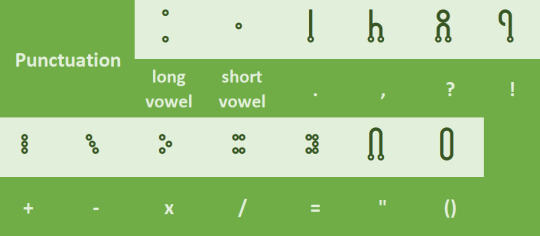
While technically Bodhan is a conlang in its own right, I think I might hold off talking about how the language itself works for now because in fairness, this is primarily a naming lang.
The IPA included doesn’t include context, but the short explanation is that some consonants soften in the presence of “i” and “e” to the second consonant shown. This definitely isn’t a perfect system and I think in hindsight I wouldn’t have “th” and “dh” entirely independent phonemes, and ditching the short vowel marker entirely because it is frankly redundant.
The concept of this script (and language) was a “sci-fi” appropriate alphasyllabary script that would look cool on the dash screen of a space ship. I think I overall achieved this goal, although the standout detail to me that I like enough I want to use again is the way the vowels are represented. The initial vowels are simply a rounded box with a single additional line to distinguish between the four, and in the CV forms the consonant radiates from a smaller version of the initial vowels. It’s not a very natural way for a script to develop but considering the setting this was made for, it is not unreasonable for it to have been made by a committee of a bunch of graphic designers. Which is to say, in-universe a neography as well as out.
This script was made pretty quickly in fonstruct, the tables in WPS Office, and while this script isn’t ideal for writing English it is probably the easiest of my creations so far to learn. A nickpicky issue I have with this script is that there is a slight kerning issue with some of the characters, but they could be fixed easily enough if I wanted to work with it further.
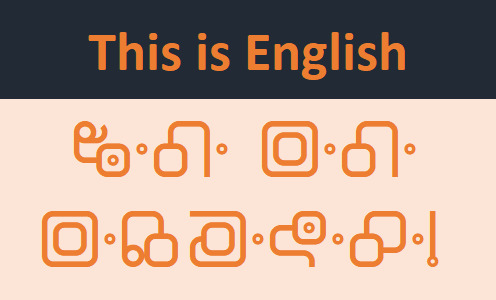
67 notes
·
View notes
Text
Hey, that's a word I've needed and created several times this year when working on conlangs! It's cool to see that it does exist in a natural language.
for as much as i’ve tried to distance myself from my native tongue i still think it’s got some really beautiful words… the english language doesn’t have anything close to this meaning
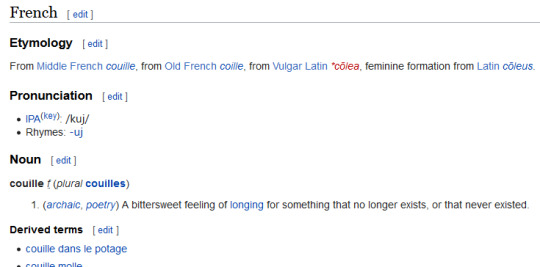
236 notes
·
View notes
Text
I hadn't really thought about this before, and I love these other tally markers that I hadn't seen before! One of my conlang's number systems is based on tally markers with dots and lines going from 1 to 10, but I hadn't really considered it a tally system.
Does your conlang have a tally system? Does it need one?
I learned about tally marks yesterday!
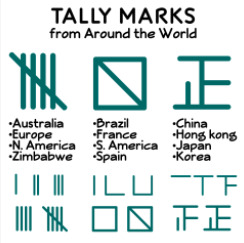
(I cross mine from R to L, but Jake does his straight through)
I was watching a kdrama and they were tallying a vote and I was just like: 😍😍😍😍
Cus I’d never considered the cultural implications of tally marks. Lol, I just thought lines to five are lines to 5, ya know? Then I read the whole wiki page and now I want to learn more!
Are there other ways? How do you make tallies? Tell me moooooooore lol ^-^
58K notes
·
View notes
Text
I just finally made the last updates needed for wave 2 of the new Lexiconga features to be ready to launch! I'm going to be testing a few more things to make sure it all works correctly and won't cause problems.
The upcoming New Features: Wave 2 update includes 3 new fields and the ability to create and use templates for your Details fields on your words! The new fields are the much-anticipated Etymology, Related Words, and Principal Parts fields! Lexiconga will automatically link to any existing words in your dictionary to words that you enter in the Etymology and Related Words fields!
In addition to these new features, there is also a collection of improvements and fixes that will come, so I hope you're as excited as I am for it to go live!
#Lexiconga#coming soon#update#features#etymology#related words#principal parts#templates#wave 2#conlanging#tools
2 notes
·
View notes
Text
Great list of questions! This will be super helpful for me!
Typology
You know what analytical/isolating, agglutinative, and fusional languages are, I presume. You’ve heard about heads and dependents and word-orders, you can tell the difference between head-initial and head-final. You know what SOV, SVO, VSO, VOS, OVS, and OSV mean, and which ones like prepositions and which ones like postpositions. Maybe you know what an ergative language is. Is that all? What else do you know about your language? Some things to think about:
Does your language have vowel harmony? OK, but does it have consonant harmony?
What restrictions does it place on the shape of roots? Are they different from restrictions on the shape of words or syllables? Can the same phoneme occur twice in a root? Are phonemes from the same class required, or banned?
Is its prosody stress-timed, syllable-timed, or mora-timed?
If it’s tonal, does it have contour tones? Is tone lexically determined? Does each syllable have marked tone?
Does your language mark grammatical relations in clauses? Does it bother to mark them at all?
Is your language accusative, ergative, tripartite, transitive, or neutral?
Is your ergative language totally ergative or split-ergative?
Does it have active-stative alignment? What determines the alignment of intransitive subjects? The semantics of the subject? The semantics of the verb? Something else?
Is it a topic-prominent language?
Does it use some other system, like an Austronesian ‘trigger’ system, or direct-inverse marking? What determines the order / marking of the arguments? An animacy hierarchy?
Does it mark experiencers of experiential verbs like agents or patients or something else?
Does your language have any ditransitive verbs? Is it dechticaetive or secundative?
Can a sentence omit any argument of the verb? Only the subject? No arguments at all?
What is the word order, and what determines it?
Is it consistently head-final or head-initial, or mixed? And where does the split occur?
Is there V2 order, or another unusual order?
Do certain structures, like subordinate clauses or questions, require different orders?
Does something other than syntactic relations determine word order?
Do relative clauses precede their head, or follow their head, or does it have internally-headed relative clauses?
Does it use a relative pronoun, another linking word, a special inflection, or no marking on the relative clause?
Does it allow gaps in a relative clause, or require resumptive pronouns?
Does it use some less common relativization strategy, like correlative constructions?
Is your language highly deranking? Are coordinate or subordinate constructions more marked?
Do you allow serial verbs?
Is your language head-marking or dependent-marking? Or double-marking? Or zero-marking? Or marks relations on something else?
Is your language inconsistent in marking type? Where does the split occur? Is there a pattern? (E.g., head-marked clauses and dependent-marked noun phrases in Bantu.)
Is your language synthetic?
Does your language have derivational morphology, but no inflectional morphology?
Do morphemes tack on to each other like legos, one after the other, in linear order? Or not?
Does it have portmanteau morphemes?
Does it have non-concatenating morphology?
Does it have templatic morphology (e.g., Semitic triliteral roots)
Is there a limit to the number of morphemes you can tack onto a root?
Do the morphemes occur in a fixed order, or can you change the order, say to indicate scope?
Do you allow multiple roots in one word form, or does each complex word have only one root, no matter how many derivations and inflections you apply to it?
Can verbs incorporate multiple verb roots?
Can verbs incorporate nouns?
If a verb incorporates a possessed noun, does the possessor get marked on its person-marking
How many different arguments are indexed in your verbs’ person-marking? None? Only subject? Subject and object? Indirect objects too? Non-core arguments?
How do you construct comparatives?
Do you use a case form or adposition, or a particle like ‘than’?
Do you have ‘exceed’ comparatives, positive-negative comparatives, or topical comparatives?
Are motion events verb-framing or satellite-framing?
For satellite-framing languages, are the motion verbs manner-conflating or figure-conflating? Or even ground-conflating?
Do you mark evidentiality?
Do you distinguish alienable and inalienable possession?
Does your language have a copula? Multiple copulas? Does it have a separate existential verb? Does it have a ‘have’ verb?
Does it have separate words for ‘tree’ and ‘wood’?
#linguistics#conlangs#conlanging#language typology#constructed languages#languages#questions#advice#considerations#helpful
120 notes
·
View notes
Text
I just generated a bunch of words for one of my conlangs using a word list that I created for something else to help give me a bit of a boost, and upon importing the ~2500 words, I've noticed some significant slowdown when using Lexiconga. This may not be a problem for the majority of users, but for those who do have a mature lexicon, I'm sure it can be a huge source of frustration.
It doesn't appear to always slow down, which makes troubleshooting a bit harder, but I'll be investigating possible solutions to this issue. I'm not sure what I'll ultimately be able to do, but there's got to be some way to keep it quick and snappy for large dictionaries!
As a reminder, if you encounter other issues with Lexiconga, you can report an issue here. I really appreciate it when people take the time to let me know about problems they come across, and I always try to work on fixes as quickly as possible!
1 note
·
View note